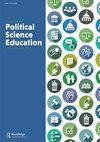美国政府课程中公民能动性的培养与衡量
IF 0.6
Q3 POLITICAL SCIENCE
引用次数: 1
摘要
学者和评论家越来越关注美国民主规范的侵蚀。在高等教育创造受过教育的公民的使命中,政治学教育处于最前沿,而公民教育与公民参与和对政府的信任等成果密切相关。然而,许多关于公民教育的研究都考察了不同的课堂干预如何影响学生未来参与公民教育的意愿。本研究认为,在意图和行动之间存在代理。具体来说,它考察了美国政府入门课程如何影响公民代理的发展。本文还介绍了一种新的基于场景的衡量公民能动性的方法。研究发现,随着学生在课程结束时对参与的计算更加敏锐,公民能动性实际上确实得到了发展。换句话说,通过学习这门课程,学生们可以更好地理解他们在哪里可以最好地参与以及如何参与。我们认为,在大学课程的这个早期阶段,增加能动性,为学生将来对一个问题足够关心而参与其中奠定了基础。本文章由计算机程序翻译,如有差异,请以英文原文为准。
Fostering and Measuring Civic Agency in an American Government Course
Abstract Scholars and commentators are increasingly concerned about the erosion of democratic norms in the United States. Political science education stands at the forefront of higher education’s mission to create an educated citizenry, and civic education is linked to outcomes like civic engagement and trust in government. Much of the research on civic education, however, examines how different classroom interventions affect students’ intentions of engaging civically in the future. This study argues that between intention and action lies agency. Specifically, it examines how an introductory course in American government influences the development of civic agency. A new scenario-based method of measuring civic agency is also introduced. The study finds that civic agency does in fact develop, with students sharpening their calculus of engagement by the end of the course. In other words, students better understand where they can best engage and how as a result of taking this course. Increasing agency at this early juncture of the university curriculum, we argue, lays the foundation for future engagement when students care about an issue enough to weigh in.
求助全文
通过发布文献求助,成功后即可免费获取论文全文。
去求助
来源期刊

Journal of Political Science Education
POLITICAL SCIENCE-
CiteScore
1.80
自引率
36.40%
发文量
69
期刊介绍:
The Journal of Political Science Education is an intellectually rigorous, path-breaking, agenda-setting journal that publishes the highest quality scholarship on teaching and pedagogical issues in political science. The journal aims to represent the full range of questions, issues and approaches regarding political science education, including teaching-related issues, methods and techniques, learning/teaching activities and devices, educational assessment in political science, graduate education, and curriculum development. In particular, the journal''s Editors welcome studies that reflect the scholarship of teaching and learning, or works that would be informative and/or of practical use to the readers of the Journal of Political Science Education , and address topics in an empirical way, making use of the techniques that political scientists use in their own substantive research.
 求助内容:
求助内容: 应助结果提醒方式:
应助结果提醒方式:


